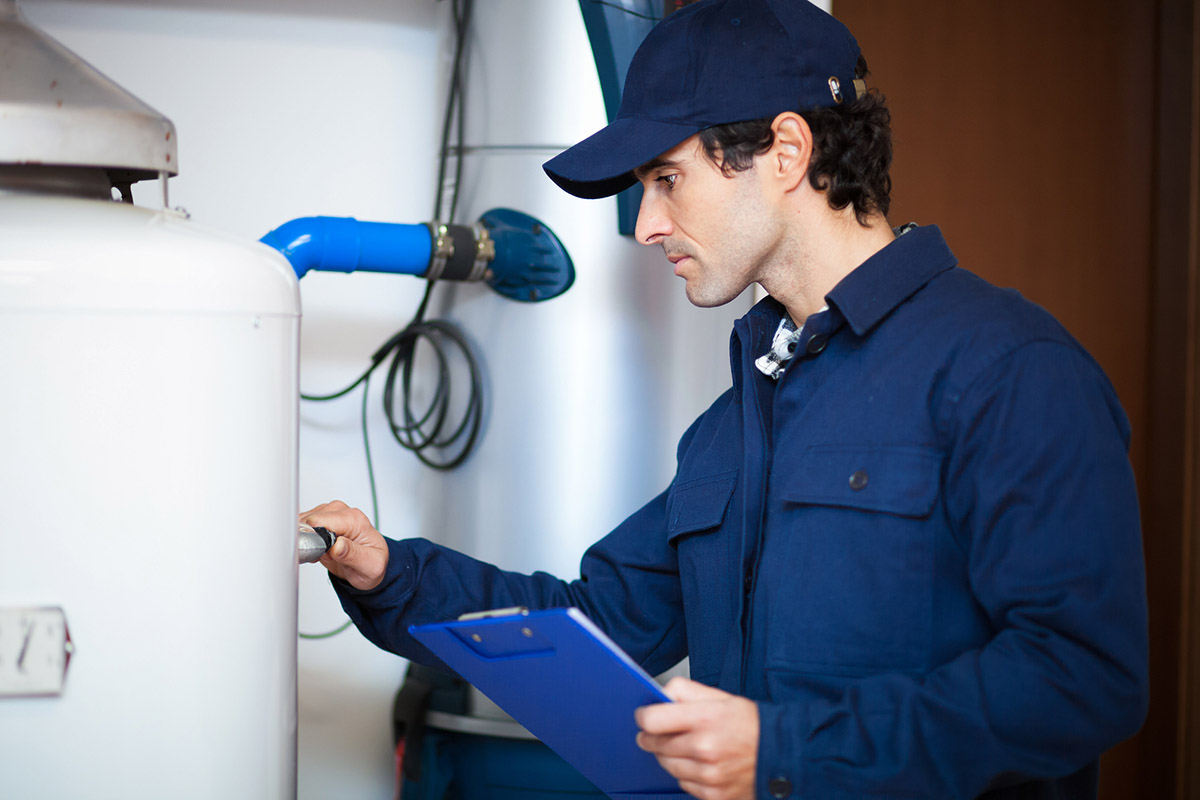We may earn revenue from the products available on this page and participate in affiliate programs. Learn More ›
Highlights
- The typical cost to replace a water heater runs from $874 to $1,765, with a national average of $1,293.
- Cost factors for water heater replacement include the water heater type, size, fuel type, brand, venting system, system location, labor and permits, and geographic location.
- Signs it may be time to replace a water heater are rusty, sandy, or cloudy water; metallic-tasting water, excessive noise, leaking, decreased water temperature, increased energy bills, or an old existing water heater.
- This project is generally best left to a professional who installs hot water heaters to ensure the installation is done safely and up to code.
A water heater is a vital home appliance that homeowners rely on to provide hot water for bathing, cleaning, and cooking. According to Angi and HomeAdvisor, the average water heater replacement cost can range from $874 to $1,765, with the national average around $1,293, depending on the type and size of the water heater. According to Bill Bruininga, owner of Billy’s Plumbing and Rooter in Chatsworth, California, “Water heaters generally last 10 to 15 years. It all depends on how each unit is installed, what maintenance you perform, and other factors like location, inlet water pressure, and chemicals in your water.” When water heaters have reached a decade or older in age, it’s a good idea for homeowners to keep an eye out for signs that the unit needs to be replaced.
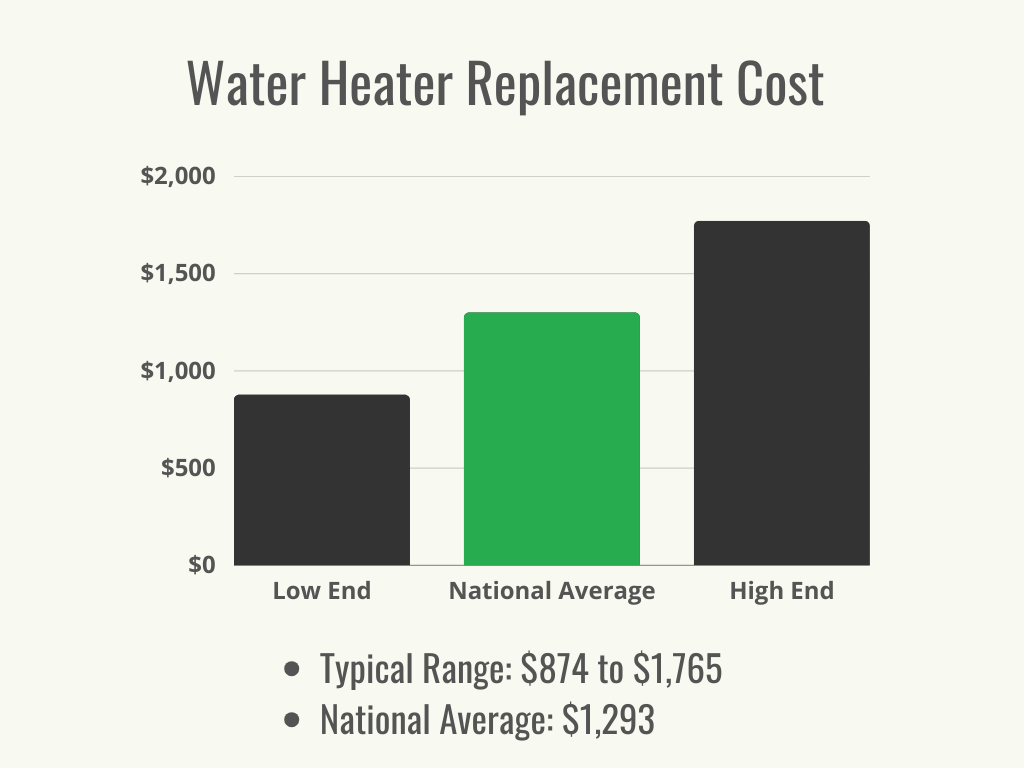
Factors in Calculating Water Heater Replacement Cost
Not all water heater replacement installations are the same. Homeowners will want to keep several cost factors in mind that could impact what they pay for this project. These include the water heater type, size, fuel type, brand, venting system, installation location, labor and permits, and geographic location.
Type and Size
Water heaters come in two main styles: storage tank and tankless water heaters. More than 90 percent of water heaters installed in the United States are tank-style heaters. A storage tank water heater stores hot water in a large tank that typically holds anywhere from 30 to 80 gallons. This type of water heater costs $1,000 on average and can run on gas, propane, electricity, or solar power. Because they are always on, they are not as efficient as tankless units.
Tankless water heaters produce hot water on demand by heating water as it enters the unit and usually cost around $2,500. These water heaters can run on gas or electricity and take up less space than tank-style units. However, they are not ideal for homes in colder climates, and larger homes may need multiple units to provide adequate hot water.
How much a homeowner will pay for a hot water heater replacement also depends on the size of the water heater. Tank-style heaters can range in size from 20 to upward of 100 gallons of storage, but a 40-gallon tank size is the most common. A 40-gallon tank is sufficient for a two-person household, but for a household with more than five people, a 60- to 80-gallon tank may be more suitable.
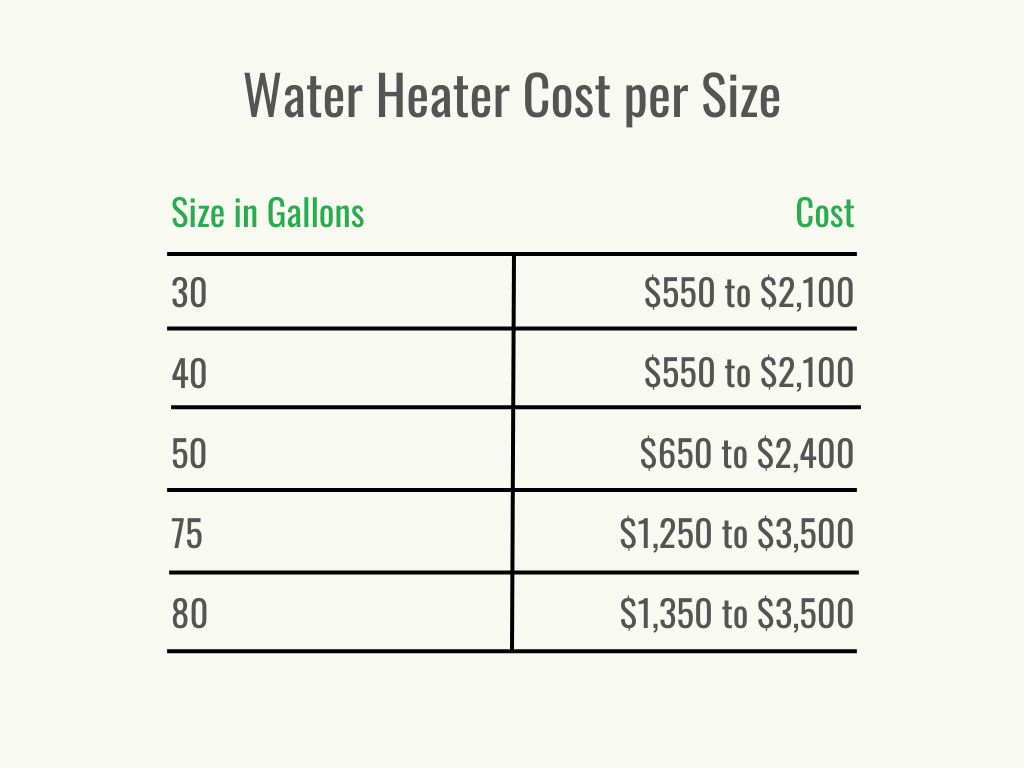
Fuel Type
Electric or gas water heaters are the most common, but homeowners can also choose to install propane-powered, indirect, solar-powered, high-efficiency, and hybrid heat pump systems. The heating is provided by either an electrical coil or by a gas pilot light.
Even though natural gas water heaters are relatively pricey and are not incredibly energy efficient, the high price of electricity often makes natural gas the most cost-effective option in the long run. Electric water heaters may work best for small apartments or extremely confined areas since they don’t need venting. A professional installer can give advice on how to choose among the best water heaters and which fuel type is best suited to a home.
Brand
The cost of a replacement water heater can also depend on the brand chosen. As with other products, some brands have a lower price point, while others are more expensive.
| Water Heater Brand | Average Cost (Unit Only) |
| A. O. Smith | $400 to $3,500 |
| Bradford White | $400 to $3,000 |
| Kenmore | $350 to $1,000 |
| Rheem | $400 to $2,300 |
| Whirlpool | $350 to $1,500 |
Venting System
Water heater venting happens in one of two ways: direct vent or power vent. A direct vent heater expels exhaust gases through an exhaust pipe or chimney above the unit.
A power vent heater has a fan or a blower that pushes gases out of the home. This type of heater averages $300 to $600 more than direct venting options, and the installation will include an additional $300 to $500 worth of wiring and electrical work.
System Location
The location of the water heater within the home can also impact the cost to replace hot water heaters. If the water heater is in a difficult-to-reach place, such as an attic or basement, or if the installers will have to carry a water heater up or down multiple flights of stairs, the installation will cost more. Since there is always the risk of a water heater springing a leak, it’s important that the water heater is located somewhere it won’t cause significant damage to the home if it does leak.
Labor and Permits
Labor costs to install a standard replacement water heater usually run from $150 to $450, but this cost can rise to $2,500 to convert from a water heater with a tank to a tankless model. Costs can vary depending on what kind of professional is required. Hiring a plumber will cost anywhere from $45 to $200 per hour, and the cost of an electrician can run from $50 to $100 an hour.
Permits for water heater replacement can range from $25 to $300, depending on the type of water heater being installed. Homeowners can pull the permit themselves or have the contractor do it and have the price added to the overall bill. If a natural gas line needs to be installed, the permit for this will cost an additional $50 to $300.
Geographic Location
The geographic location of the home impacts the overall cost of fuel prices and water heater replacement costs. The climate can affect energy use and the temperature of the water entering the heater. The colder the water is when it enters the heater, the more energy is needed to heat it to the desired temperature. Homeowners will also want to take local fuel prices into consideration when deciding on what type of water heater would work the best in their home.
| Location | Average Cost (Materials and Labor) |
| Austin, Texas | $1,300 |
| Chicago, Illinois | $1,600 |
| Dallas, Texas | $1,400 |
| Los Angeles, California | $1,900 |
| New York City, New York | $1,800 |
| Philadelphia, Pennsylvania | $1,500 |
| Phoenix, Arizona | $1,300 |
| San Diego, California | $1,900 |
Additional Costs and Considerations
When budgeting for hot water system replacement, homeowners may have additional cost factors and considerations to keep in mind. It’s worth thinking about the price of an extended warranty, removal and disposal of the old water heater, permits, the installation of water and gas lines, plumbing, electrical or carpentry work, fuel conversions, and expansion tanks.
Existing Water Heater Removal
The cost of removing the old water heater can range from $100 to $500, depending on the hourly rate of the contractor and the size and location of the unit. If the heater is difficult to access, homeowners may have to pay more for the removal of the existing water heater.
Fuel Source Conversion
Converting from gas to electric or vice versa can tack on additional costs. Altering the fuel source usually involves adding gas lines, adding electrical wiring, and installing a water line. Hiring a plumber and an electrician is necessary if this is part of the water heater replacement plan.
To add electrical wiring, homeowners can expect to pay between $550 and $2,300. Adding a water line will cost between $350 and $1,900, and a gas line addition will range from $275 to $825.
Expansion Tank Installation
An expansion tank provides additional space for water that expands as it heats. Many modern building codes require an expansion tank to be installed when replacing an old water heater. Pipes may burst when the pressure builds as the water heats. These tanks can range in price from $40 to $350.
Additional Work
Depending on the type of water heater and its location, there may be additional work required to complete the installation. For example, new electrical or gas lines will need to be put in if a homeowner decides to convert fuel types.
- Electrical. Electrical wiring fees can cost between $50 and $130 per hour on average. It can cost an additional $500 to $1,000 or more to convert from a gas water heater to an electric heater. Electric heaters require their own dedicated circuit and cannot be put on an existing line.
- Carpentry. When installing a new water heater, a new wall may need to be framed, an open area may need to be enclosed, or an enclosed area opened up. The average price for framing a wall is $200 to $400, and drywall installation can run from $1,000 to $3,000.
- Plumbing. An important factor to keep in mind during a water heater replacement is the current state of the plumbing. If pipes need to be replaced or the water heater is being moved to a different location, a plumber will charge $45 to $200 per hour for these services.
Warranties
Both tank-style and tankless water heater units usually come with a warranty that averages between 8 and 12 years. The warranty may cost extra if homeowners choose to extend the coverage time frame. If the old unit is still under warranty and can’t be repaired, its replacement may be covered.
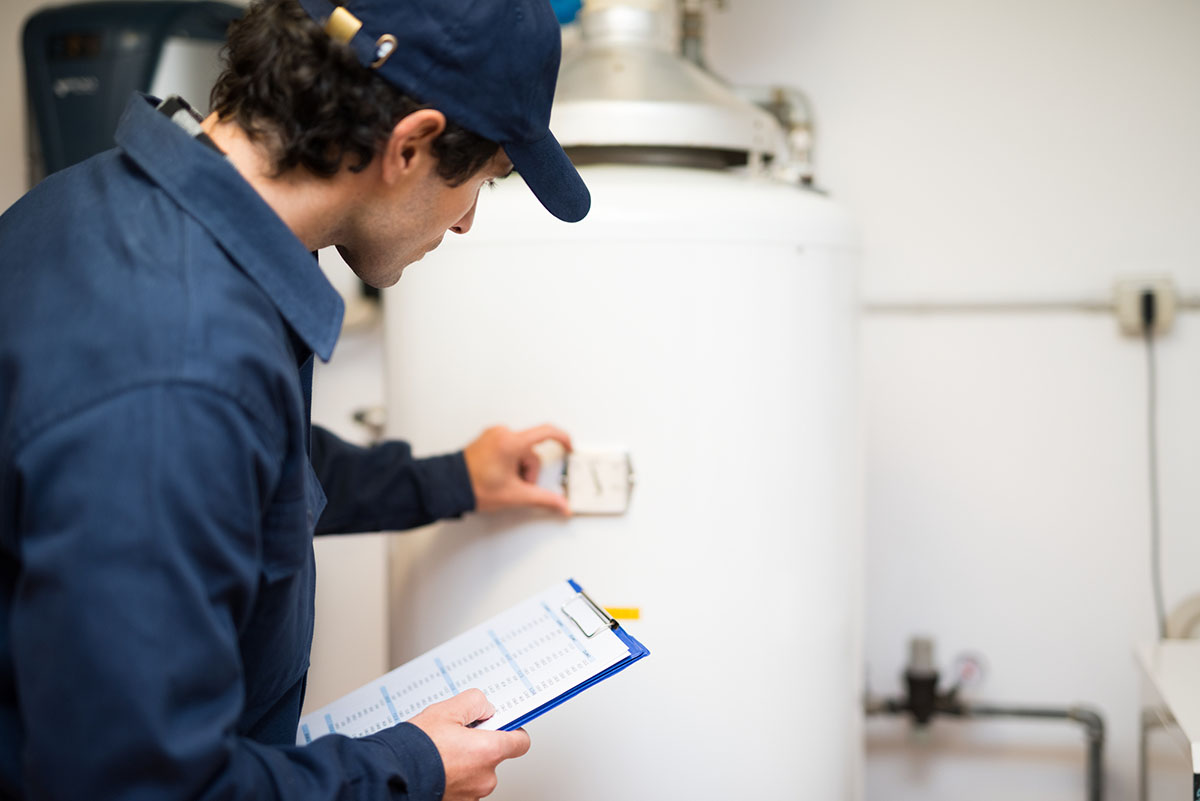
Types of Water Heaters
The cost of water heater replacement can vary depending on the type of heater. A choice of several types of heaters can be installed, including standard tank-style and tankless heaters. When determining how to choose a water heater, homeowners will want to consider all their options before deciding on the type of water heater to purchase.
| Type of Water Heater | Average Cost (Materials and Labor) |
| Electric | $600 to $3,500 |
| Gas | $700 to $2,700 |
| High-efficiency | $1,500 to $3,000 |
| Hybrid heat pump | $1,200 to $3,500 |
| Indirect | $1,200 to $3,500 |
| Propane | $700 to $2,500 |
| Solar | $1,700 to $5,500 |
Electric
Electric water heaters are cheaper to install but will cost more to run, depending on local electricity prices. Since electric water heaters rely on a home’s electricity supply, it’s worth noting that a power outage or blown fuse will result in the electric water heater not working.
These units also generally do not heat water as quickly as a gas-powered heater. These types of water heaters have fewer safety concerns and require less maintenance. Electric water heater replacement costs between $600 to $3,500 on average.
Gas
Gas water heater replacement costs tend to be relatively high at the outset, but gas water heaters will save homeowners money in the long run due to the typically higher cost of electricity. They tend to heat water quickly, and they come in energy-efficient models. Gas water heaters work when the power goes out, but there are always safety issues associated with a gas-powered heater. The installation and labor cost to replace a gas water heater can range from $700 to $2,700.
High-Efficiency
High-efficiency water heaters cost an average of $1,500 to $3,000, including labor. They’re considered 100 to 300 percent more efficient than conventional water heaters. They use a mixture of better insulation, smart controls with leak detection and protection, heat pumps, and plastic tanks to create better energy efficiency.
Hybrid Heat Pump
What is a heat pump? A hybrid heat pump water heater works by pulling heat out of the surrounding environment and transferring it to the water using coils and a compressor. This type of water heater costs $1,200 to $3,500 on average, including materials and labor. Heat pump water heaters don’t use a lot of energy, but like the cost of a standard heat pump, a hybrid heat pump water heater is expensive. Additionally, these units tend to be large and are therefore not recommended for apartments or small homes.
Indirect
Indirect water heaters use a coil inside the tank to heat the water in a very efficient way. This type of water heater costs an average of $1,200 to $3,500.
Propane
Propane-powered water heaters are more expensive than natural gas or electric heaters. These units can run upward of $700 to $2,500 including labor. Propane water heaters offer an alternative to natural gas for rural and off-the-grid homes.
Solar
A solar water heater takes its power from the sun to heat the water. Solar water heaters come in different sizes and types and are typically one of the most expensive water heaters available. The average cost for a solar water heater is between $1,700 to $5,500, but the cost can soar up to $13,000 or more. They save money in the long run by using a renewable and eco-friendly energy source, and some homeowners have supplemented a conventional water heater with a solar-powered one.
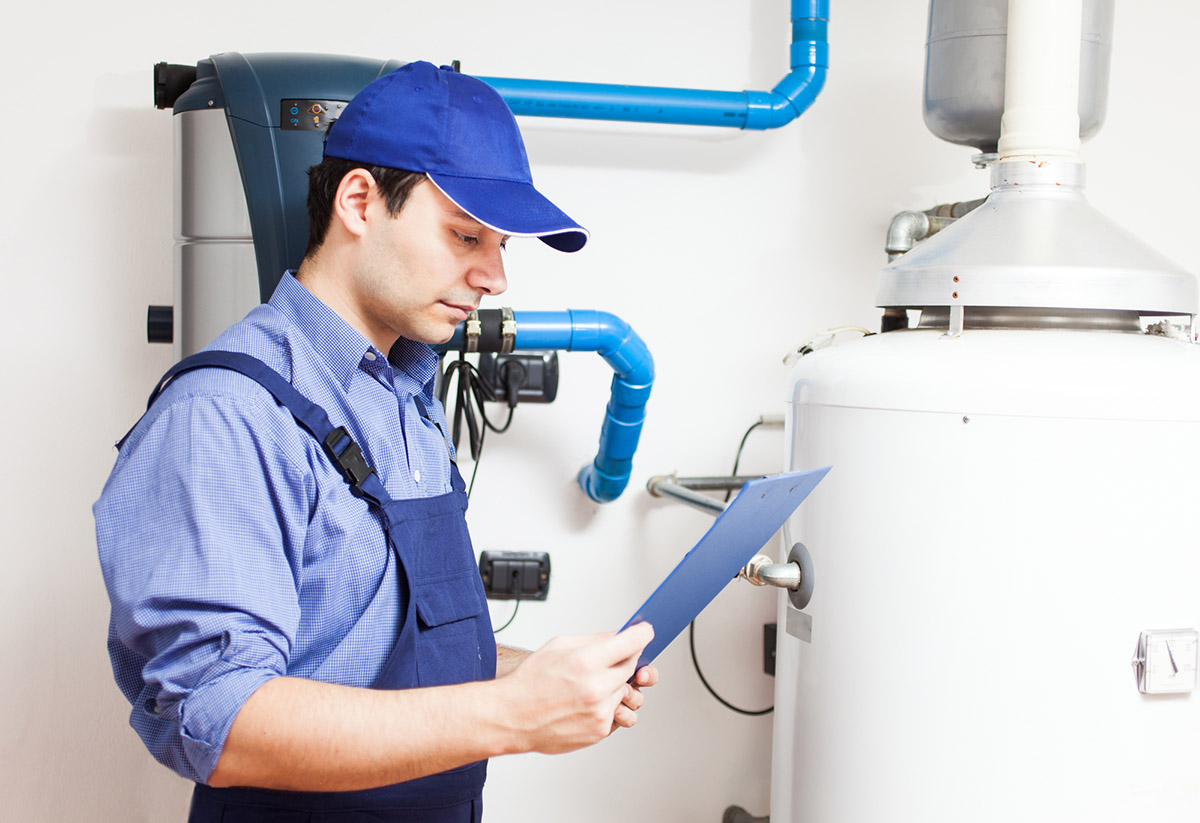
Do I need to replace my water heater?
It’s easy to ignore the existence of a water heater: out of sight, out of mind. However, it’s important for homeowners to know when to replace a water heater. Keeping an eye on the condition of the water heater will quickly reveal any warning signs of a deteriorating heater.
Rusty, Sandy, or Cloudy Water
In older water heaters, it’s common for sediment to build up on the inside of the tank, or for the unit to become corroded. Bruininga says to look for rust and calcification around water heater fittings. When this is the case, hot water may come out rust-colored, gritty, or cloudy. This can sometimes be remedied by having the water heater descaled, but if the problem persists even after maintenance, a replacement may be necessary.
Metallic-Tasting Water
If hot water has a metallic taste, this is an indication that metal from the tank is corroding and leaching into the water. Having the tank descaled could clear up the issue, but if the metallic taste is still present soon after maintenance it may be time to retire the old unit.
Excessive Noise
If a homeowner notices that the water heater is making noise, such as loud knocking or banging sounds, this typically means that there is excess sediment buildup hitting the walls of the water heater tank before making its way into the water supply. Sediment buildup can also damage the water heater over time if not removed. Water heater repair costs much less than replacement, so it’s wise to investigate strange water heater noises sooner rather than later.
Leaking
A water heater leaking is a telltale sign that it is failing. Years of heating and cooling wear out the unit over time, and the expansion can cause the metal to split. It may be possible to have the leak patched temporarily, but it will likely be necessary to replace the water heater in the near future.
Decreased Water Temperature
If it seems like water takes forever to warm up or is not reaching as high a temperature as it should, there may be an issue with the water heater’s heating elements. As Bruininga notes, when a water heater is on its last legs, “You usually notice your hot water will not last as long. [Maybe] you used to take two to three showers back to back and now struggle for one.” In some cases, repairs could remedy this issue temporarily.
Sometimes a simple water heater element replacement can fix the problem. However, if outdated parts are needed or multiple parts are failing, it could be worth it to replace the water heater.
Increased Energy Bills
An increase in energy bills may mean that the water heater is working inefficiently. Occasionally, a quick thermostat reset can remedy the issue—on average, the temperature should be set somewhere between 120 and 140 degrees. If changing the temperature on the unit does not work, it may be worth upgrading to a newer and more energy-efficient water heater.
Existing Water Heater’s Age
Like most appliances, water heaters wear out after a certain age. Basic tank water heaters can be expected to last between 8 and 12 years, and tankless heaters have a longer lifespan of 20 years. However, according to Bruininga, “After 10 years, most manufacturers recommend replacement [regardless of] issue.” This is because repairs may be more costly than the cost to replace the unit, or replacement parts may be difficult to come by.
DIY vs. Hiring a Professional
While it may be tempting for homeowners to search online for “how to replace a water heater” and attempt the installation themselves, this is a project that’s best left to the professionals unless the homeowner is highly skilled with handling plumbing, gas lines, and electrical work. The intense labor and comprehensive knowledge of installing a water heater make this a job that’s best suited for a professional. “It’s essential to understand all the new plumbing code requirements to help install a tank heater properly,” Bruininga adds. “[For] tankless water heaters I would always use a professional.”
Who fixes water heaters? Typically, homeowners will need to call a plumber to fix or replace their water heater. A water heater replacement project needs permits and inspections, and if anything goes wrong, the cost of cleanup, repairs, and updating an improper installation can skyrocket. A plumber can recommend the best water heater for the home, has access to a wide selection of the best brands and models, will handle obtaining the permit, and will install a new water heater correctly and safely the first time. When it comes time to replace a water heater, the best way to be sure the job is done right and is up to code is to employ one of the best plumbing services like Mr. Rooter and Roto-Rooter to install the unit.
How to Save Money
Hiring one of the best water heater repair services can be expensive, and the additional costs associated with installation can quickly add up. One way to save money is to replace the water heater with another of exactly the same size and type, but there are a few other ways to save money without compromising on the features homeowners want in their new water heater.
- Consider size. Buying a unit that’s too large will result in the homeowner paying more for a larger heater and for the energy over the entire lifespan of the appliance.
- Fuel type. The choice of natural gas, electric, or an alternative power source depends on the location of gas lines and the overall budget. Consider the overall cost, and weigh the pros and cons of each.
- Rebates, special offers, and tax credits. Homeowners who use a gas water heater that is recognized as Energy Star Most Efficient meet the requirements to receive a tax credit equal to 30 percent of the project cost up to a maximum of $600. Energy Star provides a comprehensive rebate finder list of other money-saving offers, which is available by ZIP code.
- Shop around. Get quotes from several different plumbers, and compare installation and labor costs.
- Look into home warranties. A home warranty can cover the cost of repairing or replacing appliances such as water heaters. Homeowners who do not already have home warranty coverage may want to look into the best home warranty companies, such as American Home Shield and AFC Home Club.
Questions to Ask a Pro
Asking a plumber or professional water heater installer the right questions can help minimize miscommunication, save money, and get the desired results. There are several questions for homeowners to ask about water heater replacement when hiring a contractor.
- Should I buy a tank-style or a tankless water heater?
- What size tank do I need?
- Will the water heater be energy efficient?
- How long will the installation take?
- Will you dispose of the old water heater?
- What brands can I choose from?
- Does the water heater have a warranty?
- How much is the total cost?
- Who will install the new unit?
FAQs
Choosing the best water heater replacement contractor and keeping the overall water heater replacement cost down can be a daunting process. The answers to some frequently asked questions about hot water heater replacement can help guide homeowners in their decision.
The difference in cost between tank and tankless water heaters is significant, with tank-style units being the least expensive option. The most affordable water heater to install would be a standard tank-style unit. On average, the price of this type of water heater runs from $650 to $2,500, including materials and labor. Tankless water heaters cost two to three times more than standard tank heaters.
A tank-style water heater can last 6 to 15 years, and a tankless unit has at least a 20-year lifespan. Homeowners can extend the length of a water heater’s life by scheduling regular maintenance and replacing the unit’s anode rod, which protects the unit from corrosion and typically lasts around 5 years.
It is recommended to hire a professional to install a new water heater. Professional water heater installation will ensure the heater is installed correctly and is up to current building codes. Because of the labor and extensive knowledge this project requires, hiring a professional is safer than DIY-ing the install, and it will avoid any potential hazards that come from working on gas lines or doing electrical work.
In all, replacing a water heater with a unit of a similar design will take between 2 and 3 hours. If the old unit has a tank and the new unit is tankless, the process will take longer.
Banging or knocking sounds coming from the unit, leaking, rusty or gritty hot water, and lack of hot water are all potential signs of water heater failure. Noticing these signs can help homeowners get ahead of the problem and replace the unit before it fails.
Angi, HomeAdvisor, The Home Depot

